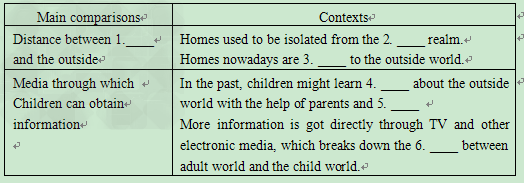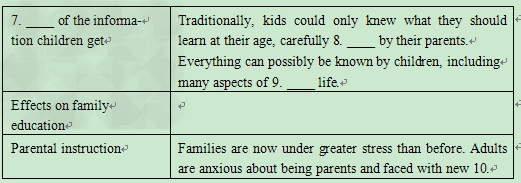阅读理解.
The family sphere (范围) used to be defined by its isolation from the public realm.
There was the public male realm (领域)of "rational accomplishment" and cruel competition,
and the private female and child-rearing sphere of home, intuition (直觉) and emotion. The
private realm was supposed to be isolated firm the realities of adult life. For both better and
worse, television and other electronic media tend to break down the difference between
those two worlds. The membrane around the family sphere is much more permeable
(可渗透的). TV takes public events and transforms them into dramas that are played
out in the privacy of our living rooms, kitchens and bedrooms.
Parents used to be the channel through which children learned about the outside world.
They could decide what to tell their children and when to tell it to them. Since children
learn to read in stages, books provide a kind of natural screening process, where adults
can decide what to tell and not tell children of different reading abilities. Television
destroyed the system that separated adult from child knowledge and separated
information into year-by-year slices for children of different ages. Instead, it presents the
same information directly to children of all ages, without going through adult filters.
So television presents a real challenge to adults. While a parent can read a newspaper
without sharing it with children in the same room, television is accessible to everyone in
that space. And unlike books, television doesn't allow us to flip (翻转) through it and see
what's coming up. We may think we're giving our children a lesson in science by having
them watch the Challenger take off, and then suddenly they learn about death, disaster and
adult mistakes.
Books allow adults to discuss privately what to tell or not tell children. This also allows
parents to keep adult material secret from children and keep their secret keeping secret.
Take that same material and put it on The Today Show and you have 800,000 children
hearing the very things the adults are trying to keep from them. "Television takes our kids
across the globe before parents give them permission to cross the street."
More importantly, children gradually learn that adults are worried and anxious about
being parents. Actually, television has also places families under a lot of stress.




